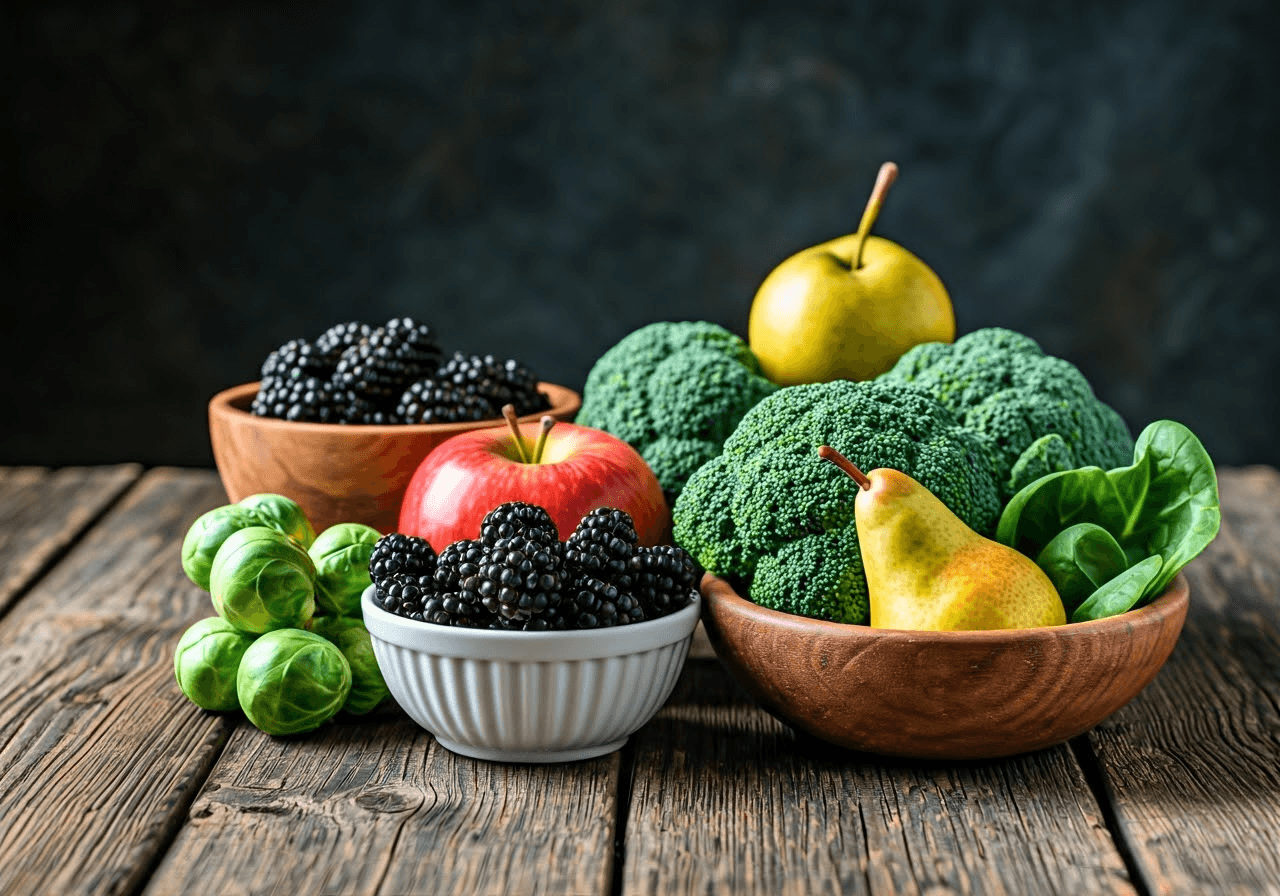
Introduction
Good digestive health is key for feeling good overall. Fiber intake is very important in keeping everything balanced. Dietary fiber might not get enough attention, but it is an essential nutrient that helps with gut health and regular bowel movements. This guide looks into fiber, its types, why it matters, and how it affects digestive health.
What Is Fiber?
Fiber, also called roughage or bulk, is part of the carbohydrate family. Unlike sugars and starches that our bodies absorb, fiber moves through our digestive system mostly unchanged. This special feature makes fiber very important for our health!
Instead of breaking down, fiber goes through the digestive tract. It adds bulk to our stools and helps keep regular bowel movements. It works like a natural cleaner, helping everything move smoothly.
What Is Dietary Fiber?
Dietary fiber is a kind of fiber found in plant-based foods. You can see it in fruits, vegetables, legumes, and whole grains. It is important for our digestive health. It helps add bulk to our diet, keeps things regular, and supports a healthy gut microbiome.
There are two main types of dietary fiber: soluble and insoluble fiber. Each type has its own properties and effects on our bodies.
Knowing the differences between these types of fiber helps us make better choices for our digestive well-being.
Why Fiber Is Classified as a Carbohydrate
Fiber is commonly linked to digestion and regularity, but it is actually a type of carbohydrate. This might sound surprising because, unlike simple sugars and starches, our bodies do not break down dietary fiber.
Even though fiber does not give us energy directly, it is still classified as a carbohydrate due to how it is structured. Both fiber and digestible carbs are made of sugar molecules joined together in chains. However, fiber has different links between its sugar molecules compared to digestible carbs.
These special links in dietary fiber stop our digestive enzymes from breaking them down. This is why fiber cannot be digested and why it is very good for our gut health.
How Fiber Works in the Digestive System
Fiber starts its journey in our digestive system as soon as we eat foods rich in fiber. When it moves through the stomach and small intestine, fiber mostly stays undigested. This is different from other nutrients, which get broken down and absorbed.
Once fiber reaches the large intestine, it really shows its benefits. Soluble fiber works like a sponge. It soaks up water and creates a gel-like substance. This helps to soften the stool, making it easier to pass and promoting regularity.
On the other hand, insoluble fiber adds bulk to the stool. It encourages the muscles in the intestines to contract and push waste products through. The combination of soluble and insoluble fiber helps keep our digestive system healthy and efficient.
Types of Fiber
Understanding the different types of dietary fiber helps us see the various benefits they provide. There are two main kinds of fiber: soluble and insoluble fiber. Each type plays a different role in our health.
In addition, we should consider fermentable and non-fermentable fibers. Prebiotic fibers also have a big impact on our health. All of these aspects show how important fiber is for our well-being.
Soluble vs. Insoluble Fiber
Soluble fiber can dissolve in water. In our gut, it changes into a gel-like form. This helps to slow down digestion and makes us feel full. It can also lower cholesterol by linking to it in the digestive system.
Insoluble fiber does not change much when we digest it. It adds bulk to our stools, which helps with regular bowel movements and prevents constipation.
In simple terms, soluble fiber helps with digestion and absorption. Insoluble fiber supports smooth transit and waste removal.
Table: Soluble vs. Insoluble Fiber at a Glance
| Property | Soluble Fiber | Insoluble Fiber |
|---|---|---|
| Water Solubility | Dissolves in water to form a gel-like substance | Does not dissolve in water |
| Food Sources | Oats, barley, beans, lentils, apples, citrus fruits, psyllium | Whole wheat, brown rice, nuts, seeds, carrots, cucumbers, leafy greens |
| Main Benefits | Lowers cholesterol, regulates blood sugar, increases satiety | Promotes regularity, prevents constipation, adds bulk to stool |
| Role in Digestion | Slows digestion and nutrient absorption, feeds gut bacteria (prebiotic action) | Speeds up transit time and helps food pass through the digestive tract |
| Best For | Managing blood sugar, heart health, weight loss, IBS | Preventing constipation, maintaining regular bowel movements |
Fermentable vs. Non-Fermentable Fiber
When we look closer at fiber, we find two main types: “fermentable” and “non-fermentable.” These categories show how our gut bacteria work with different fibers.
Fermentable fiber is like food for the good bacteria in our gut. When these bacteria break down the fiber, they create short-chain fatty acids (SCFAs) such as butyrate. These acids give energy to the cells in our colon, help lower inflammation, and provide many health benefits.
Non-fermentable fiber, as the name suggests, doesn’t get broken down by gut bacteria. Instead, it helps make stool bulkier and supports regular bowel movements.
Prebiotic Fibers and Their Function
Among the many types of fiber, prebiotic fibers are special. They are great for helping our gut microbiome. These fibers work like “fertilizers” for the good bacteria in our gut.
When we eat prebiotic fibers, they go to the large intestine mostly unchanged. There, our gut bacteria enjoy these fibers as food. As they break down the fibers, they create helpful compounds, like short-chain fatty acids. This supports a healthy and various gut microbiome.
A healthy gut microbiome, helped by prebiotic fibers, boosts our immune system. It also improves how we absorb nutrients. Plus, it can even affect our mental health through the connection between our gut and brain.
Health Benefits of Fiber
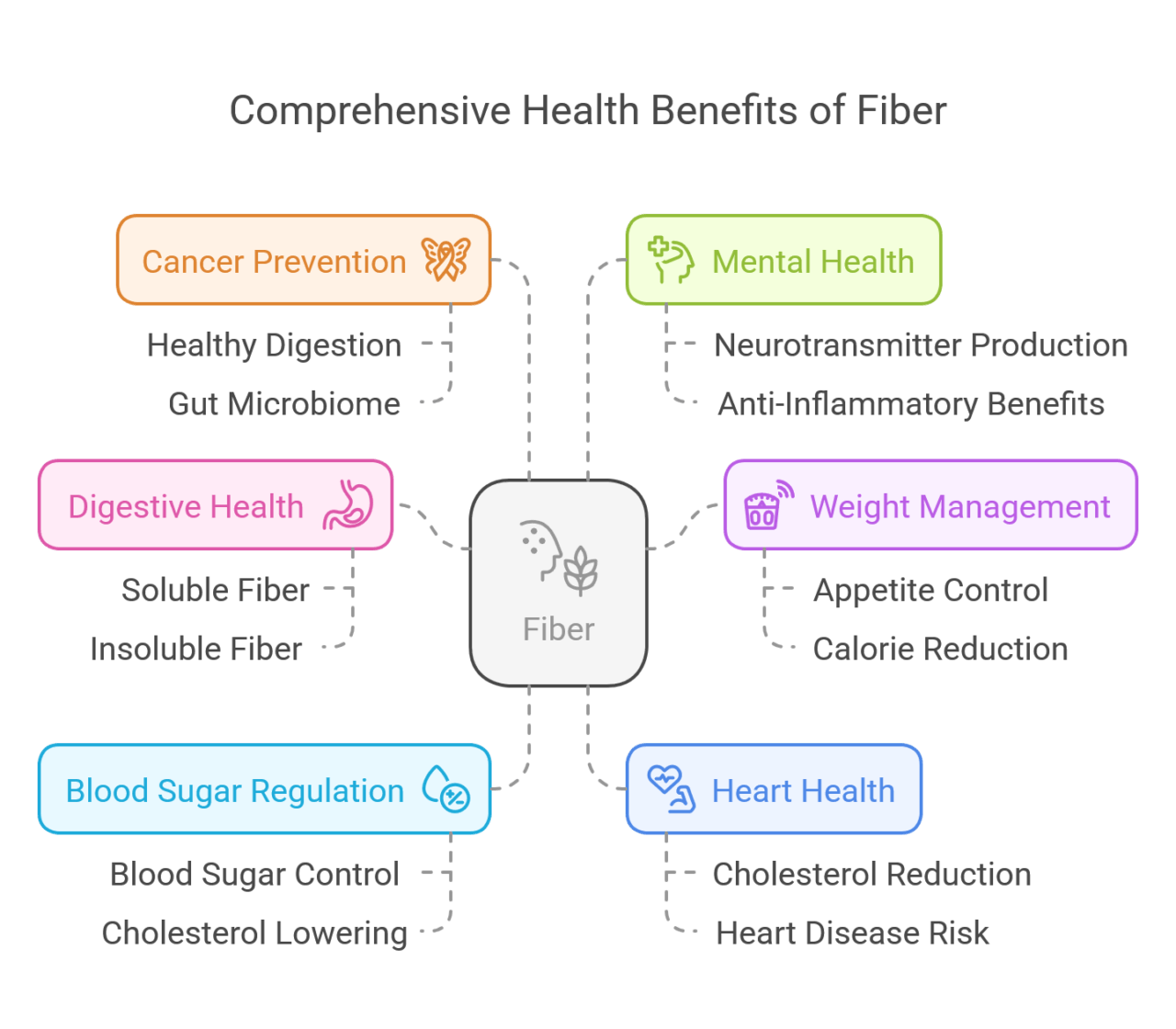
Fiber doesn’t just help with digestive health. It also helps control blood sugar levels, manage weight, and lower the chance of chronic diseases. Fiber is like a silent protector for our overall health.
Eating enough fiber each day can lead to a healthier and more active life.
Digestive and Bowel Health
The best-known benefit of fiber is how it helps with digestive health. Fiber is good for our digestive system, and it comes in two types: soluble and insoluble.
Soluble fiber soaks up water, which makes the stool bulkier and softer. Insoluble fiber helps the muscles in the intestines move food along, leading to regular bowel movements. Together, these types of fiber can stop and ease constipation.
Eating enough fiber is important. It keeps the digestive system working well, supports a healthy gut microbiome, and lowers the chance of having digestive issues.
Weight Management and Appetite Control
Fiber is a great friend when it comes to managing weight. It helps you feel full and reduces your appetite, which can support a healthy weight.
Soluble fiber is especially important for weight management. When it mixes with water, it creates a thick gel in the gut. This gel slows down digestion and keeps food in the stomach longer.
Feeling full for a longer time helps stop overeating and can lower the number of calories you eat. This makes it easier to manage your weight.
Blood Sugar and Cholesterol Regulation
Fiber is very important for keeping healthy blood sugar levels. It slows down how quickly sugar enters the blood, which stops big jumps in blood sugar, especially after eating.
This is particularly helpful for people with type 2 diabetes or those who might get the condition. By avoiding sudden changes in blood sugar, fiber helps improve control over it.
Additionally, some types of soluble fiber, like psyllium husk, can lower cholesterol. They stick to cholesterol in the gut, stopping it from getting into the bloodstream.
Heart Health and Longevity
A diet high in fiber, especially soluble fiber, can lower the risk of heart disease. This happens because fiber helps lower cholesterol levels.
As soluble fiber moves through the digestive system, it attaches to bile acids that have cholesterol. This stops them from being reabsorbed into the blood. This process lowers the cholesterol in the bloodstream, which is a big factor in heart disease.
By supporting healthy cholesterol levels, a diet rich in fiber helps improve heart health. It can lessen the chances of heart attacks and strokes.
Cancer Prevention
Research shows that a diet high in fiber, especially one filled with fruits, vegetables, and whole grains, can help prevent cancer. The exact ways it works are still being explored, but there are some ideas about it.
One important part is how fiber helps create a healthy digestive system. It reduces constipation and helps waste move through the digestive tract faster. This means the colon has less contact with harmful substances.
Fiber also acts as food for good gut bacteria. This helps maintain a healthy gut microbiome. A balanced gut microbiome can lower inflammation and boost the immune system. Both of these factors may help in preventing cancer.
Mental Health and Inflammation
Emerging research shows a strong link between gut health and mental health, both influenced by fiber intake. The gut-brain axis is a complex connection that allows communication between the digestive system and the brain.
A healthy and varied gut microbiome, supported by a high-fiber diet, helps create neurotransmitters like serotonin and dopamine. These are important for mood, sleep, and thinking.
Fiber also has anti-inflammatory benefits that support good mental health. Long-lasting inflammation has been linked to many mental health problems. By lowering inflammation in the body, fiber may help protect against these issues.
Natural vs. Supplemental Fiber: A Comparison of Sources
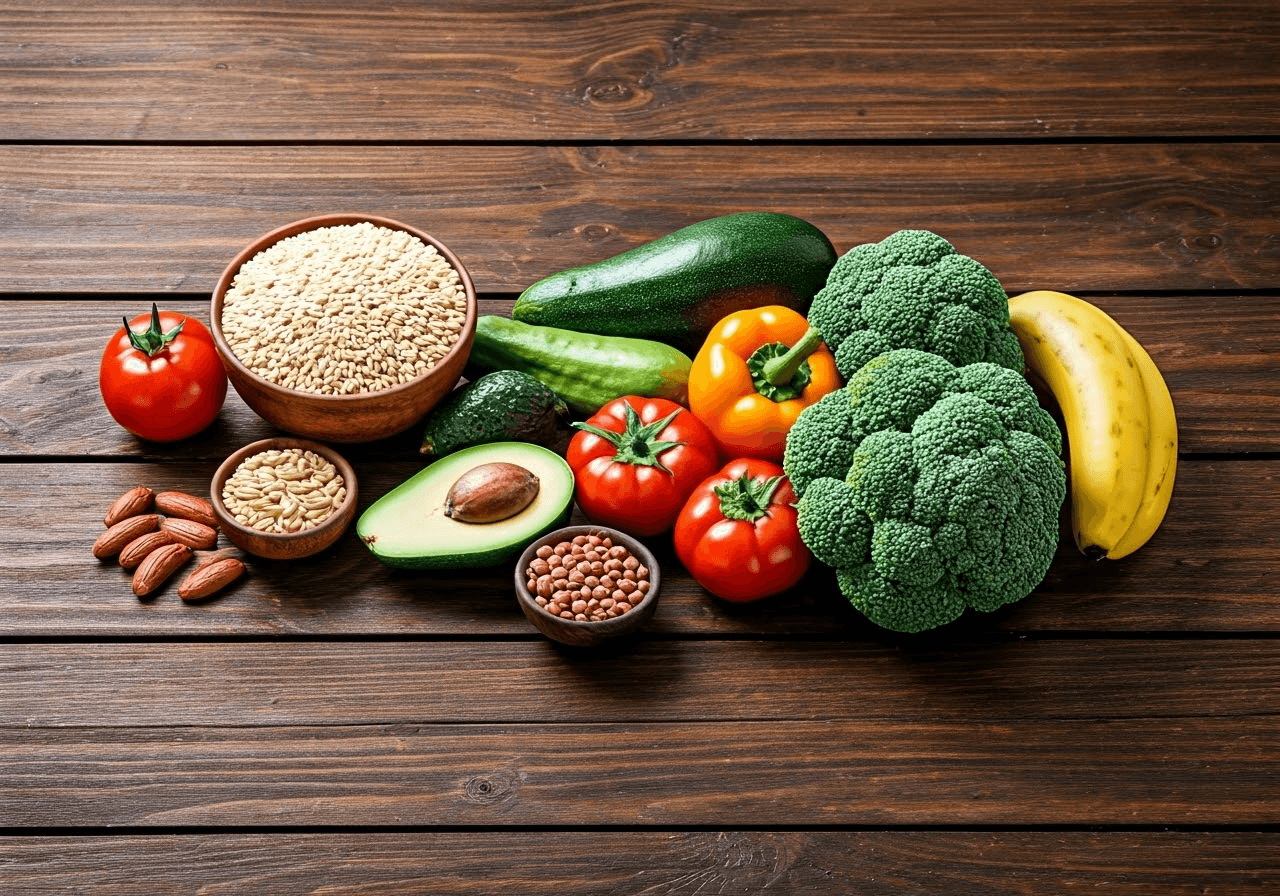
Getting fiber from whole food sources is the best option. However, fiber supplements can help when you don’t get enough fiber from your diet. It’s important to know the difference between natural fiber and fiber from supplements. This can help you make better choices for your health.
Let’s look at the advantages and disadvantages of each option. This will give you the information you need to make good decisions for your well-being.
Whole Food Fiber Sources
Nature gives us many tasty and easy sources of fiber. Adding a variety of these foods to our daily meals is the best way to get the fiber we need in a sustainable and healthy way.
Fruits and vegetables are top sources of fiber, especially those you can eat with their skins and seeds. Berries, apples, pears, broccoli, Brussels sprouts, and leafy greens are all great choices.
Whole grains keep their fiber because they haven’t been changed like refined grains, which lose their fiber. For more fiber, choose brown rice, quinoa, oats, and whole-wheat bread and pasta.
Also, remember legumes! Lentils, beans, and chickpeas are full of fiber and offer a good amount of protein and other important nutrients.
When Supplements Are Necessary
While it is important to focus on whole food sources of fiber, there are times when fiber supplements are needed.
For those who find it hard to get enough fiber from food, maybe because of digestive issues, diet restrictions, or health problems, fiber supplements can help.
Sometimes, doctors may suggest fiber supplements to help with constipation, manage irritable bowel syndrome (IBS), or keep blood sugar levels steady.
Remember, fiber supplements should be used along with a healthy diet that is rich in fiber. Always talk to your doctor or a registered dietitian before adding fiber supplements to your daily routine.
Comparing Absorption and Effectiveness
The discussion about natural fiber versus supplemental fiber often comes up. Both types help with fiber intake, but they work a bit differently in the body.
Natural fiber comes from whole foods and is seen as better because it works well with other nutrients in the food. The fiber in these foods is often mixed with vitamins, minerals, and antioxidants. This mix helps the body absorb and use these nutrients better.
Supplemental fiber provides a strong dose of fiber on its own. While it can be helpful, it may not offer all the health benefits that whole foods do.
Both natural and supplemental fiber can increase your fiber intake and offer health benefits. But the choice between the two depends on your needs and what you prefer to eat.
Natural vs. Supplemental Fiber
Choosing between natural fiber and supplemental fiber is about what each person needs and likes.
Natural fiber comes with other important nutrients. This could lead to better health benefits since it promotes a balanced and varied diet.
On the other hand, supplemental fiber is easy to use and provides a consistent amount. This makes it a good choice for people who find it hard to get enough fiber from food alone. It can also help with specific health issues.
Knowing the differences between these sources can help you make smart choices that fit your eating goals and preferences.
Natural Fiber vs. Supplemental Fiber: Pros and Cons
| Feature | Natural Fiber | Supplemental Fiber |
|---|---|---|
| Nutrient Density | High – comes with vitamins, minerals, antioxidants, and phytonutrients | Low – isolated fiber without accompanying nutrients |
| Convenience | Requires meal planning and prep | Easy to use – available in powders, capsules, gummies |
| Bioavailability | Often better absorbed due to synergistic nutrients in whole foods | May not offer full benefits of whole-food fiber |
| Risk of Overuse | Low – difficult to consume too much through food | Higher – concentrated doses may cause bloating, gas, or nutrient interference |
| Ideal For | General health, balanced diet, long-term digestive and cardiovascular support | Individuals with fiber deficiency, specific conditions, or limited food variety |
How Much Fiber Do You Need?
Knowing how much fiber you need for good health depends on things like your age, gender, and health. It’s a good idea to ask healthcare professionals for advice. They can give you tips that fit your needs. This helps keep your digestive system healthy and improve your overall well-being.
Daily Recommendations
While each person’s needs can be different, general advice gives a nice place to start for daily fiber intake. The Institute of Medicine suggests that adult men should aim for 38 grams of fiber each day, while women should aim for 25 grams.
It is important to understand that these amounts are just averages. Things like how active you are, your overall health, and specific diet plans can change what you need.
It’s best to spread out your fiber intake throughout the day for better digestion and absorption. Try to add fiber-rich foods to each meal and snack. This will help keep a good supply of fiber.
If you want to increase your fiber intake, do it slowly. This helps your digestive system adjust and reduces any discomfort, like bloating or gas.
Special Cases
While the fiber intake recommendations are useful, some people might need more or less fiber for different reasons.
For example, pregnant women usually need more fiber to help their changing digestive systems and avoid constipation. Nursing mothers might also need more fiber to help with recovery after giving birth and keep their bowel movements regular.
Athletes and active people often need more calories, which may mean they need more fiber too. Getting enough fiber helps their digestive health, energy, and overall performance.
People with certain digestive issues, like irritable bowel syndrome (IBS), may need special fiber advice based on their symptoms and how much they can handle.
Fiber Deficiency: Signs and Risks
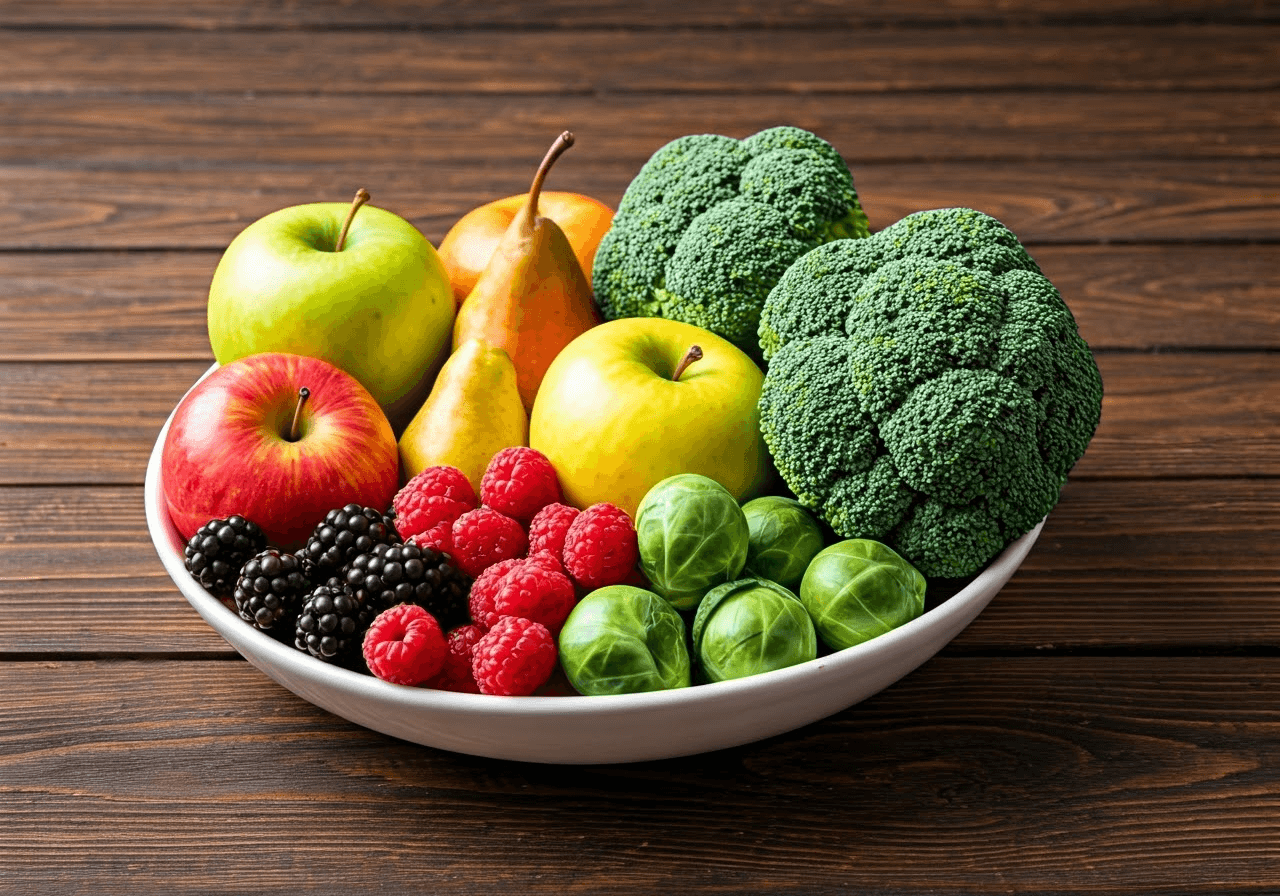
Not eating enough fiber can cause many health issues. Recognizing the early signs and knowing the long-term risks of low fiber intake can help you make changes for better health. Getting advice from a professional can help fix fiber deficiency effectively.
Early Symptoms of Deficiency
Recognizing the early signs of not getting enough fiber is important. It helps to address problems quickly and prevent serious issues. Not having enough fiber can show in different ways. Often, these signs are mild at first but indicate a problem in the digestive system.
A common early sign is constipation. This means having less frequent bowel movements, struggling to pass stools, and feeling like the bowel isn’t empty. Bloating and gas are also clear signs. These occur when the gut can’t digest food properly without enough fiber.
Surprisingly gaining weight or finding it hard to lose weight can also relate to low fiber intake. Fiber helps you feel full and manage appetite. Without enough fiber, a person may feel hungrier and end up eating more calories than they need.
Long-Term Health Risks
Not getting enough fiber can cause many health problems, not just belly issues.
When you don’t eat enough fiber over a long time, you may be at a higher risk of diverticulitis. This condition happens when small pouches in the colon get inflamed or infected. Low fiber makes the walls of the colon weaker, which can lead to these pouch formations.
Heart disease is also a big risk tied to low fiber intake over time. Fiber is important because it helps keep cholesterol levels down. When we don’t eat enough fiber, cholesterol can build up in our arteries. This increases the chances of heart attacks and strokes.
The risk of type 2 diabetes also grows when fiber is low. Fiber helps keep blood sugar levels in check. Without enough fiber, this balance is disturbed. This can lead to a condition known as insulin resistance, which may result in type 2 diabetes.
Diagnosing Low Fiber Intake
Diagnosing a low fiber intake usually starts with looking closely at your diet. Healthcare professionals may ask you to remember what you typically eat each day. This helps them understand how much fiber you get on average.
Keeping a food diary for a few days or using food tracking apps can show a clearer picture of your fiber intake. These tools can help you find areas where you can improve your diet and point out any consistent lack of fiber.
Your doctor will also consider other factors that might affect your symptoms. They will look at your medical history, lifestyle habits, and any existing health problems to help make a clear diagnosis.
If a low fiber intake is found to be the cause of your health issues, your doctor may recommend specific changes to your diet. They might also suggest fiber supplements to help fix the problem effectively.
Fiber Supplements Guide
Finding your way around fiber supplements can feel confusing. There are many kinds and forms to choose from. Knowing about the various types of fiber supplements helps you make smart choices. This way, you can have a safe and effective experience.
Let’s look closely at fiber supplements. This will help you make the best choices for your health.
Types of Fiber Supplements
Fiber supplements come in different forms and offer unique benefits and downsides. Knowing these differences can help you find the best supplement for you.
Some common types of fiber supplements are:
- Psyllium Husk: This comes from the seeds of the Plantago ovata plant. Psyllium husk is famous for adding bulk. It absorbs water and swells in the gut. This helps make stools bulkier and can improve regularity.
- Methylcellulose: This is a synthetic form of soluble fiber. It dissolves in water and creates a thick gel. Methylcellulose is often used as a bulk-forming laxative. It can help you have regular bowel movements.
- Wheat Dextrin: This comes from wheat starch. Wheat dextrin is a soluble fiber that many people tolerate well. It helps soften stools and supports regularity without causing much gas or bloating.
Table: Comparison of Common Fiber Supplements
| Type | Solubility | Source | Best Use | Common Side Effects | Notes |
|---|---|---|---|---|---|
| Psyllium | Soluble (some insoluble) | Plantago ovata seeds | Constipation, cholesterol control, IBS | Bloating, gas, cramping | Forms a gel; very effective for bulk-forming; often in Metamucil |
| Methylcellulose | Soluble | Synthetic (plant cellulose derivative) | Constipation, easy-to-mix fiber | Rare side effects; well tolerated | Non-fermentable, less gas-producing; used in Citrucel |
| Wheat Dextrin | Soluble | Wheat starch | General digestive support, mild cases of constipation | Possible gas in sensitive individuals | Gluten-free versions available; dissolves completely in water |
| Inulin | Soluble & Fermentable | Chicory root, Jerusalem artichoke | Prebiotic support, gut microbiota health | Gas, bloating, discomfort | Promotes good bacteria but may cause fermentation-related discomfort |
| Glucomannan | Soluble (high viscosity) | Konjac root | Weight loss, appetite control, cholesterol, constipation | Bloating, nausea, throat blockage (if dry) | Expands in stomach; must be taken with lots of water |
| Acacia Fiber | Soluble & Fermentable | Acacia tree sap | Gentle prebiotic, IBS-friendly option | Rare side effects; well tolerated | Very gentle; dissolves well; supports gut flora without gas |
Choosing the Right Supplement
With so many fiber supplements to choose from, picking the right one can be tough. You need to think about a few things to find the best supplement for your needs.
First, check the type of fiber in the supplement. There are types like psyllium husk, methylcellulose, inulin, and partially hydrolyzed guar gum. Each one works differently and offers its own benefits.
Next, look at the dosage and how much you should take. The amount of fiber you require may change based on your age, gender, and health.
Also, consider the form of the supplement. Fiber supplements come as powders, capsules, gummies, and chewable tablets. Pick a form that suits your lifestyle. It should be easy for you to take.
How to Take Them Safely
Taking fiber supplements is generally safe for most people, but it is important to use them wisely. This helps you get the best results and lowers the chance of side effects.
Always begin with a lower amount than what is suggested on the label. This allows your body to adjust. Then, you can slowly increase the amount until you find what works best for you.
Drinking enough water is very important when you take fiber supplements. Fiber needs water, and not drinking enough can make constipation worse or cause stomach issues. Try to drink plenty of water every day, especially if you are increasing your fiber intake.
Taking your fiber supplement at the right time can make it more effective. Using fiber supplements with meals or just after can help you feel full, support healthy blood sugar levels, and lower blood sugar levels while reducing any possible stomach troubles.
Use this quick reference guide to take fiber supplements, such as caplets, safely and effectively while minimizing discomfort and maximizing benefits:
| Action | Recommendation | Notes |
|---|---|---|
| Starting Dosage | Begin with a low dose (half the suggested amount) | Allows your digestive system to adjust gradually |
| Water Intake | Drink at least 8 oz (240 ml) of water with each dose | Prevents constipation and supports fiber movement through the intestines |
| Best Time of Day | Take with meals or just after eating | Helps with fullness, reduces risk of stomach upset |
| Combining with Meds | Space fiber supplements at least 1–2 hours before or after medications | Fiber may interfere with absorption of certain drugs |
| How to Adjust | Gradually increase dosage over 1–2 weeks | Reduces chances of bloating, cramping, or gas |
Side Effects and Precautions
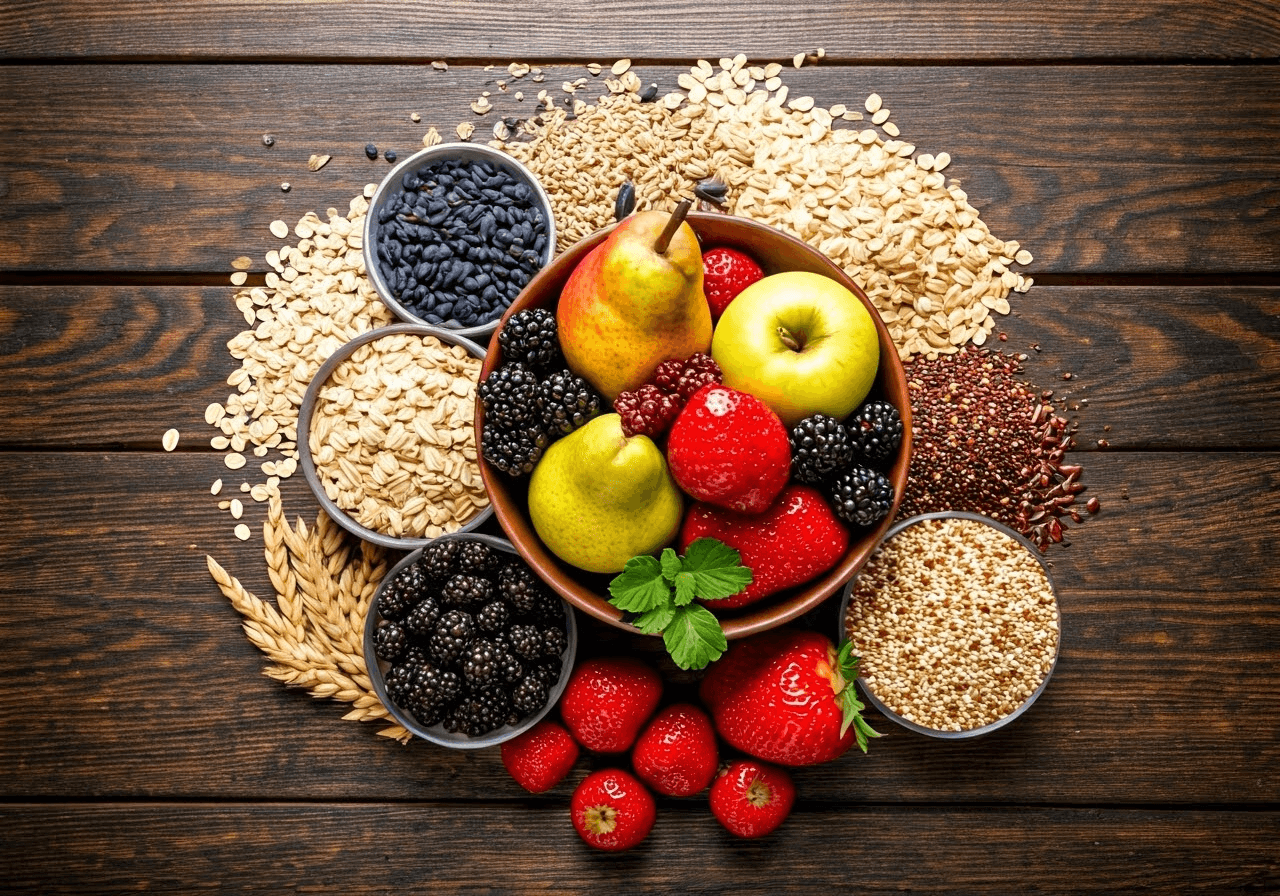
Fiber is good for your health, but it’s important to have realistic expectations when using fiber supplements. You should be aware of possible side effects and take steps to prevent them. This way, you can have a better experience and get the most health benefits from fiber supplements.
Common Side Effects
When you add fiber supplements to your daily routine, you might notice some mild side effects. This is normal, especially if you are just starting or taking more than usual. Usually, these side effects are short-lived and go away once your body gets used to the extra fiber.
The most common issue is bloating or gas. This happens because soluble fiber ferments in the gut and produces gas as it breaks down. While it is generally not serious, too much gas can cause discomfort.
Another possible side effect is constipation. This is more likely if you don’t drink enough fluids along with your fiber. Since fiber takes in water, not staying hydrated can actually make constipation worse.
Some people might also feel mild stomach cramps or diarrhea if they increase their fiber intake too quickly. Most of these side effects are temporary and can be managed by slowly adjusting the amount you take.
How to Minimize Discomfort
Fiber supplements are usually safe for most people, but they can cause some discomfort, especially at the start or in large amounts. There are easy ways to reduce these side effects and have a better experience.
Start slowly. Instead of taking a large dose all at once, begin with a small amount of the fiber supplement. You can slowly increase the amount over several days or weeks. This way, your body can get used to it. A gradual increase helps your digestive system adjust to the higher fiber intake.
Drink enough water. Fiber takes in water in your stomach, so it’s important to drink plenty over the day. This is especially true when you are raising your fiber intake. Good hydration can help prevent constipation and supports smooth bowel movements.
Picking the right type of psyllium fiber supplement can help reduce any discomfort. Some types of fiber, like psyllium husk, may create more gas than others. Trying out different types of fiber can help you find what works best for your digestive system.
Drug Interactions and Chronic Conditions
Fiber supplements are often seen as safe. However, they can interact with some medications and may not be good for people with certain ongoing health issues. It is important to know about these possible interactions. Always talk to a healthcare professional if you have any health concerns.
Fiber can stick to things in the digestive system, which might affect how well medications are absorbed. This can make some medications less effective. If you’re taking any prescription drugs, make sure to discuss it with your doctor or pharmacist before you start using a fiber supplement.
People with existing digestive issues, such as irritable bowel syndrome (IBS) or Crohn’s disease, should be careful with fiber supplements. Although fiber typically helps with digestion, some types of fiber or large amounts can make symptoms worse for those with sensitive digestive systems.
Fiber Supplements and Medication Interaction
Fiber supplements may affect some medications. It’s important to know about these interactions to make sure your medication works well and to keep you healthy.
Fiber can stick to things in your stomach. This is usually good for digestion, but sometimes it can stop medicines from being absorbed. If this happens, the medicine might not work as well as it should.
For example, fiber supplements can have issues with antibiotics, blood thinners, and some antidepressants. The time you take fiber in relation to your medications can also matter. It’s best to take fiber supplements a few hours before or after your medications.
Always talk to your doctor or pharmacist about any interactions before starting a new supplement, like fiber.
Special Use Cases
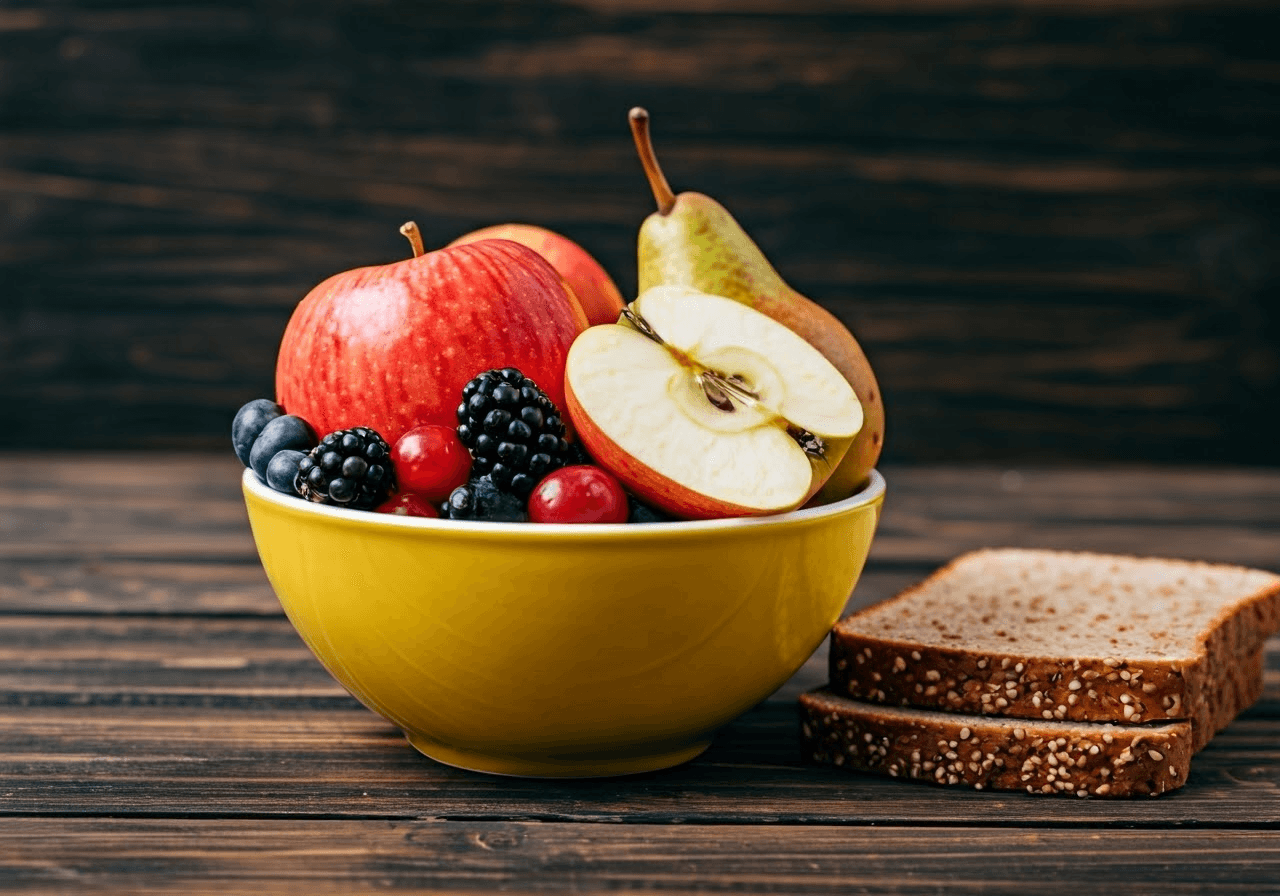
Fiber supplements are useful for certain groups of people and different situations. They meet the special needs of some individuals, helping improve their health and performance.
Looking into these unique cases helps us better understand the various advantages of fiber and how it can be used for the best outcomes.
Fiber for Athletes and Fitness
Athletes and fitness fans need more nutrients than people who are not active, and fiber is included in this. Getting enough fiber is important for supporting their tough training, helping with recovery, and keeping them healthy.
During hard workouts, the body mainly uses glycogen found in muscles and the liver for energy. Soluble fiber helps by slowing down how fast sugar enters the blood, leading to a steady flow of energy and stopping quick ups and downs in blood sugar levels.
Keeping blood sugar levels stable is essential for having enough energy during training, which helps delay tiredness and boosts performance. Plus, fiber helps people feel full and controls hunger. This is useful for athletes who watch their calorie intake.
Age-Specific Fiber Supplement Guide
Different age groups can benefit from different types of fiber supplements to meet their specific health needs. A guide on fiber supplements based on age can help people find the best options for better health.
For infants and toddlers, getting enough fiber from a well-balanced diet with fruits, vegetables, and whole grains is usually enough. As their digestive systems grow, slowly adding fiber-rich foods helps them meet their daily fiber needs.
Children and teens often struggle to get enough fiber because of processed foods and sugary drinks. The right fiber supplements can help fill this gap and support good digestive health.
Adults can benefit from both natural and supplement sources of fiber and probiotics to meet their daily goals. This can help with issues like constipation, managing cholesterol, or keeping blood sugar levels in check.
Table: Recommended Fiber Intake and Supplementation by Age Group
| Age Group | Daily Fiber Goal | Recommended Supplement (if needed) | Notes |
|---|---|---|---|
| Toddlers (1–3) | ~19 grams | Not typically recommended; focus on fruits & veggies | Introduce fiber slowly; monitor for tolerance |
| Kids (4–8) | ~25 grams | Mild supplements like inulin if diet is low in fiber | Prioritize whole grains and plant-based snacks |
| Teens (9–18) | Girls: 26g / Boys: 31–38g | Psyllium or methylcellulose for digestive issues | High activity = higher need; avoid overuse |
| Adults (19–50) | Women: 25g / Men: 38g | Psyllium, inulin, wheat dextrin as needed | Adjust based on diet, health goals, and gut response |
| Seniors (51+) | Women: 21g / Men: 30g | Gentle options like acacia fiber or partially hydrolyzed guar gum | Hydration is crucial; higher risk of constipation |
Disclaimer: Always consult with a healthcare provider or registered dietitian before giving fiber supplements to children or adjusting fiber intake for specific medical conditions or life stages.
Conclusion
Fiber supplements provide a simple way to improve digestion and boost your overall health. Adding fiber to your meals can help with digestive health, control your weight, keep blood sugar levels steady, support heart health, and may lower the chances of some cancers. It’s important to eat enough fiber daily, whether from whole foods or supplements. Pay attention to signs of not getting enough fiber. Knowing the different types of fiber can help you choose the right supplements. Always talk to your doctor for advice tailored to you. Use the benefits of fiber for a healthier and happier life.
The content on WellwayHub.com is intended for general informational purposes only and should not be taken as medical advice. Please consult your doctor or a qualified health professional before making any changes to your health routine.
Some links on WellwayHub.com may be affiliate links. This means we may earn a small commission if you make a purchase through these links, at no extra cost to you. This helps support our mission to provide trusted wellness content.
Frequently Asked Questions
Getting fiber from whole foods is best because it works well with other nutrients. If you aren’t getting enough fiber in your diet, fiber supplements can help fill that gap.
The effectiveness of fiber supplements can change based on the type you use and the individual. Usually, you might start to notice effects in a few days to a week.
It’s usually safe to use a fiber supplement. However, it is a good idea to talk to your doctor. They can give you personal advice on how to use it daily.
The best time to take fiber can change from person to person and depends on the kind of supplement you are using. You should follow the instructions on the product label. It’s a good idea to talk to your doctor as well.
Bloating and gas are usual side effects that can happen when you start taking fiber supplements. This is especially true if you suddenly increase how much you take.
It is important to talk to your doctor before you take any supplements, like fiber, while you are pregnant. This will help to make sure that it is safe and that you get the right amount.
In general, fiber supplements do not greatly affect how your body absorbs vitamins or minerals. Still, it’s a good idea to check with your healthcare provider.
Children should mainly get fiber from the foods they eat. It’s important to talk to a pediatrician before giving your child any fiber supplements.
Fiber pills and powders provide similar benefits. The key difference is convenience and what you personally prefer.
Taking fiber supplements without food can raise the chances of side effects, such as bloating or gas. It is usually better to have them with your meals.